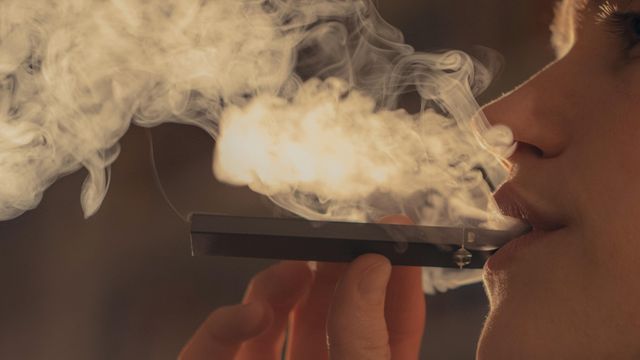NC sues leading e-cigarette maker over teen marketing, sales
North Carolina Attorney General Josh Stein filed suit Wednesday against Juul Labs, alleging that the nation's largest e-cigarette company targets minors in marketing and selling its products.
Posted — Updated"We cannot allow another generation of young people to become addicted to nicotine," Stein said at a news conference, noting that the lawsuit seeks a court order that would halt many of Juul's tactics that he says have erased the gains the state made over years in reducing teen tobacco use.
Stein said Juul targets young smokers by infusing its liquid nicotine with fruity and dessert flavors; packaging its products to look like flash drives, making them easy to hide at school or home; using social media influencers – he called it a 21st-century equivalent to the old cartoon "Joe Camel" cigarette campaigns – to market e-cigarettes; and selling online where it's harder to verify a customer's age.
"You only have to walk through any high school parking lot in North Carolina to see how pervasive Juul is among young people in our state," he said, noting one in five high school students have reported in surveys that they have used a Juul product in the last 30 days.
Juul spokesman Ted Kwong said the company shares Stein's concerns about teen use of e-cigarettes and has been taking steps to prevent it, including raising the age for tobacco purchases nationwide to 21.
"We have taken the most aggressive actions of anyone in the industry to combat youth usage," Kwong said in an emailed statement. "We stopped the sale of non-tobacco and non-menthol based flavored JUULpods to our traditional retail store partners, enhanced our online age-verification process, strengthened our retailer compliance program with over 2,000 secret shopper visits per month and shut down our Facebook and Instagram accounts while working constantly to remove inappropriate social media content generated by others on those platforms."
Nationwide, e-cigarette use has soared by 78 percent in the past year among high school students and 48 percent among middle school students, Stein said. U.S. Surgeon General Jerome Adams and Scott Gottlieb, who recently stepped down as commissioner of the U.S. Food and Drug Administration, have declared e-cigarette smoking among teens a "public health epidemic" in recent months and are taking steps like those sought by Stein to crack down on it.
Stein dismissed Juul's voluntary efforts to reduce teen use of e-cigarettes, noting the $38 billion company could backtrack at any time. The state's lawsuit, which is the first of its kind nationwide, seeks an injunction barring Juul from the following:
- Selling any flavored liquids other than tobacco and mint in the state
- Advertising near schools or playgrounds
- Sponsoring sporting or entertainment events
- Providing free or discounted products
- Sending marketing emails to minors
- Advertising in ways that appeal to minors
- Misrepresenting the nicotine potency of its products
The North Carolina Attorney General's Office has been investigating Juul since last fall, and Stein said the probe found the company misstates the levels of nicotine in its products. It's so high that some countries ban using Juul products at any age, he said, but the company understates it and downplays the risks.
Dr. Susan Kansagra, chief of the Chronic Disease and Injury Section of the state Department of Health and Human Services, said the nicotine in one Juulpod is more than what's in a pack of cigarettes and is highly addictive. Like cigarettes, Juul's liquid nicotine contains other harmful chemicals, such as heavy metals and benzene, she added.
North Carolina had cut teen tobacco use from about 27 percent usage down to about 5 percent since 2000, but Juul's e-cigarettes "have single-handedly reversed those trends ... and those gains that we had made," Kansagra said.
Luka Kinard, a sophomore at High Point Central High School, said he had to enter a 40-day treatment program to break him of his addiction to e-cigarettes.
"It started to become my identity," Kinard said of smoking e-cigarettes in high school. "I thought it was cool. It turns out it wasn't"
His grades dropped, he quit extracurriculars like sports and Boy Scouts, he lost weight and he suffered a seizure. His relationships with his family and friends also became "very explosive."
Kelly Kinard said her son suffered from a substance abuse problem related to Juul.
"Like millions of other parents, we did not see this coming," she said. "Overnight, the child we raised had disappeared. We were living with a kid who was completely dependent on Juul to self-medicate his Juul-induced anxiety."
Stein said he's not trying to ban Juul, noting that some people use e-cigarettes as a way to stop smoking. But he said he doesn't want the $38 billion company to grow by recruiting teens who haven't smoked before.
"Juul created and spread a disease – the disease of addiction – among North Carolina teenagers," Stein said. "Juul must be stopped from spreading this disease any further."
• Credits
Copyright 2024 by Capitol Broadcasting Company. All rights reserved. This material may not be published, broadcast, rewritten or redistributed.






